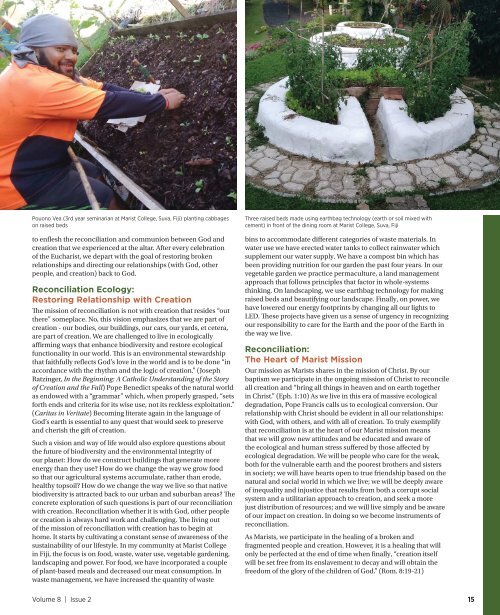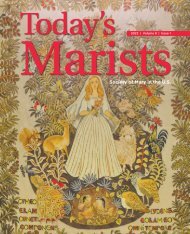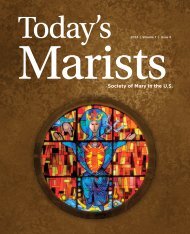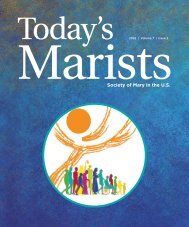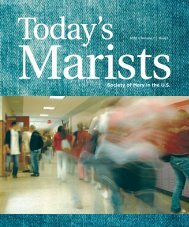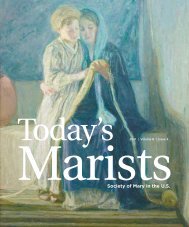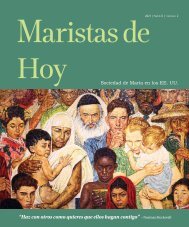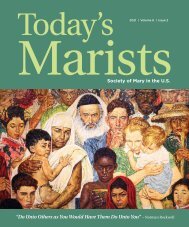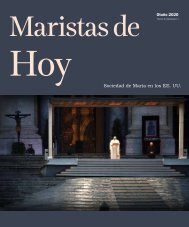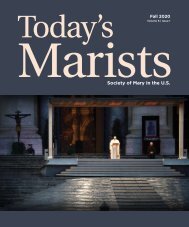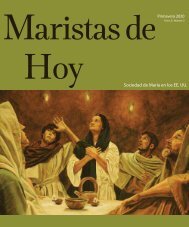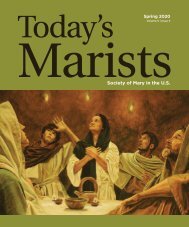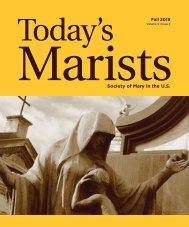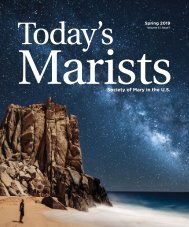Today's Marists 2024 Volume 8, Issue 2
Create successful ePaper yourself
Turn your PDF publications into a flip-book with our unique Google optimized e-Paper software.
Pouono Vea (3rd year seminarian at Marist College, Suva, Fiji) planting cabbages<br />
on raised beds<br />
to enflesh the reconciliation and communion between God and<br />
creation that we experienced at the altar. After every celebration<br />
of the Eucharist, we depart with the goal of restoring broken<br />
relationships and directing our relationships (with God, other<br />
people, and creation) back to God.<br />
Reconciliation Ecology:<br />
Restoring Relationship with Creation<br />
The mission of reconciliation is not with creation that resides “out<br />
there” someplace. No, this vision emphasizes that we are part of<br />
creation - our bodies, our buildings, our cars, our yards, et cetera,<br />
are part of creation. We are challenged to live in ecologically<br />
affirming ways that enhance biodiversity and restore ecological<br />
functionality in our world. This is an environmental stewardship<br />
that faithfully reflects God’s love in the world and is to be done “in<br />
accordance with the rhythm and the logic of creation.” (Joseph<br />
Ratzinger, In the Beginning: A Catholic Understanding of the Story<br />
of Creation and the Fall) Pope Benedict speaks of the natural world<br />
as endowed with a “grammar” which, when properly grasped, “sets<br />
forth ends and criteria for its wise use, not its reckless exploitation.”<br />
(Caritas in Veritate) Becoming literate again in the language of<br />
God’s earth is essential to any quest that would seek to preserve<br />
and cherish the gift of creation.<br />
Such a vision and way of life would also explore questions about<br />
the future of biodiversity and the environmental integrity of<br />
our planet: How do we construct buildings that generate more<br />
energy than they use? How do we change the way we grow food<br />
so that our agricultural systems accumulate, rather than erode,<br />
healthy topsoil? How do we change the way we live so that native<br />
biodiversity is attracted back to our urban and suburban areas? The<br />
concrete exploration of such questions is part of our reconciliation<br />
with creation. Reconciliation whether it is with God, other people<br />
or creation is always hard work and challenging. The living out<br />
of the mission of reconciliation with creation has to begin at<br />
home. It starts by cultivating a constant sense of awareness of the<br />
sustainability of our lifestyle. In my community at Marist College<br />
in Fiji, the focus is on food, waste, water use, vegetable gardening,<br />
landscaping and power. For food, we have incorporated a couple<br />
of plant-based meals and decreased our meat consumption. In<br />
waste management, we have increased the quantity of waste<br />
Three raised beds made using earthbag technology (earth or soil mixed with<br />
cement) in front of the dining room at Marist College, Suva, Fiji<br />
bins to accommodate different categories of waste materials. In<br />
water use we have erected water tanks to collect rainwater which<br />
supplement our water supply. We have a compost bin which has<br />
been providing nutrition for our garden the past four years. In our<br />
vegetable garden we practice permaculture, a land management<br />
approach that follows principles that factor in whole-systems<br />
thinking. On landscaping, we use earthbag technology for making<br />
raised beds and beautifying our landscape. Finally, on power, we<br />
have lowered our energy footprints by changing all our lights to<br />
LED. These projects have given us a sense of urgency in recognizing<br />
our responsibility to care for the Earth and the poor of the Earth in<br />
the way we live.<br />
Reconciliation:<br />
The Heart of Marist Mission<br />
Our mission as <strong>Marists</strong> shares in the mission of Christ. By our<br />
baptism we participate in the ongoing mission of Christ to reconcile<br />
all creation and “bring all things in heaven and on earth together<br />
in Christ.” (Eph. 1:10) As we live in this era of massive ecological<br />
degradation, Pope Francis calls us to ecological conversion. Our<br />
relationship with Christ should be evident in all our relationships:<br />
with God, with others, and with all of creation. To truly exemplify<br />
that reconciliation is at the heart of our Marist mission means<br />
that we will grow new attitudes and be educated and aware of<br />
the ecological and human stress suffered by those affected by<br />
ecological degradation. We will be people who care for the weak,<br />
both for the vulnerable earth and the poorest brothers and sisters<br />
in society; we will have hearts open to true friendship based on the<br />
natural and social world in which we live; we will be deeply aware<br />
of inequality and injustice that results from both a corrupt social<br />
system and a utilitarian approach to creation, and seek a more<br />
just distribution of resources; and we will live simply and be aware<br />
of our impact on creation. In doing so we become instruments of<br />
reconciliation.<br />
As <strong>Marists</strong>, we participate in the healing of a broken and<br />
fragmented people and creation. However, it is a healing that will<br />
only be perfected at the end of time when finally, “creation itself<br />
will be set free from its enslavement to decay and will obtain the<br />
freedom of the glory of the children of God.” (Rom. 8:19-21)<br />
<strong>Volume</strong> 8 | <strong>Issue</strong> 2 15


